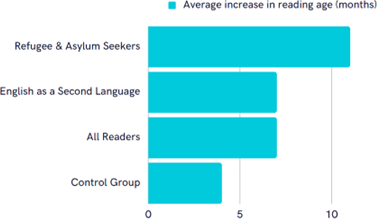“ ”
Identifying a robust reading assessment
“The aim was to improve the children's reading comprehension skills,” explains Tilly, “and to introduce vocabulary recognition exercises and phonics to those with lower levels of English.” The next step was to identify a robust reading assessment to achieve this. “We wanted to measure the impact”, Sarah adds. “We needed to have that hard evidence to say ‘Look, this is what's happening!’”
This is where NGRT came highly recommended. “I didn't have any expert knowledge in the assessment programmes that were out there, so I asked our Special Educational Needs team in the City Council,” Sarah explains, “and NGRT was recommended from a Senior Advisor in the Local Authority who specialises in Special Educational Needs.”
Transforming reading comprehension skills
Tilly manages the provision across the ten primary and secondary schools involved in the project. “The tests are very easy to use,” says Tilly. “The children log in; it takes me maybe an hour to test 25-30 kids, and then I send my information back to the school so that they have it.” The pupils sat NGRT to determine their reading ages, then N.E.S.T. ran weekly reading sessions across each school. After 12 weeks, the pupils retook NGRT, and the reading ages were compared to see if they had improved.
Tilly recalls a success story with a particular pupil in the project: “In Central Walker Primary School, where we work, I remember one of the boys improved by four years in a period of just 12 weeks.” In this case, the pupil demonstrated he had the ability, yet didn't understand how to answer the question. “Just going in with the volunteers to make sure that he understood how to answer exam-type assessment questions was transformational for him.”
“In Kenton Bar Primary School, for example, the first-year results were excellent. And we were thinking maybe they wouldn't be quite as good in the second year, because we've already worked with most of the children. But they were actually the best results we had out of any of the schools in the second year.”

N.E.S.T. Schools Project NGRT data
“ ”
Reading for enjoyment
“I love data!” says Sarah, “So the fact that you can track all the changes is amazing. The school that I used to teach in has just adopted the test throughout their key stages. So, they've used that to track progress because they've found it so clear. It had so much information and highlighted children that they didn't necessarily see that were falling behind their actual age on the tests. It's easy to identify children that really are struggling, but it's those ones that might be dipping.”
“NGRT is fantastic because it's about comprehension – it's not about reading words and not understanding what they mean. It's a proper comprehension test rather than a reading words test.”
Evidencing the success of the project
The success of the N.E.S.T. Schools Project in improving reading comprehension skills has been validated by the outcomes of NGRT. “The data certainly reflects the success of the project and it's been great to write about in the yearly reports and then show to our funders, Scholastic (who donated books), and the Council,” explains Sarah.
The project was originally commissioned for three years and is now in its third. Despite financial pressures, the City Council are hoping to keep this going. “Teachers do not want children pulled out of lessons unless it's very beneficial,” Sarah explains. “Because we can show that these children have improved in confidence and they're happy, I think that the school really see that benefit. They would be very unhappy if it didn't continue.”
Tilly echoes Sarah’s sentiments: “Ideally in the future, we’d just do more. We'd work in more schools and have more funding and more volunteers and everything. It's a great opportunity for the volunteers.” Sarah adds: “These students are really giving up their time. It's a lot of commitment and actually quite emotional because they build up these lovely connections with their pupils that they're working with.”


